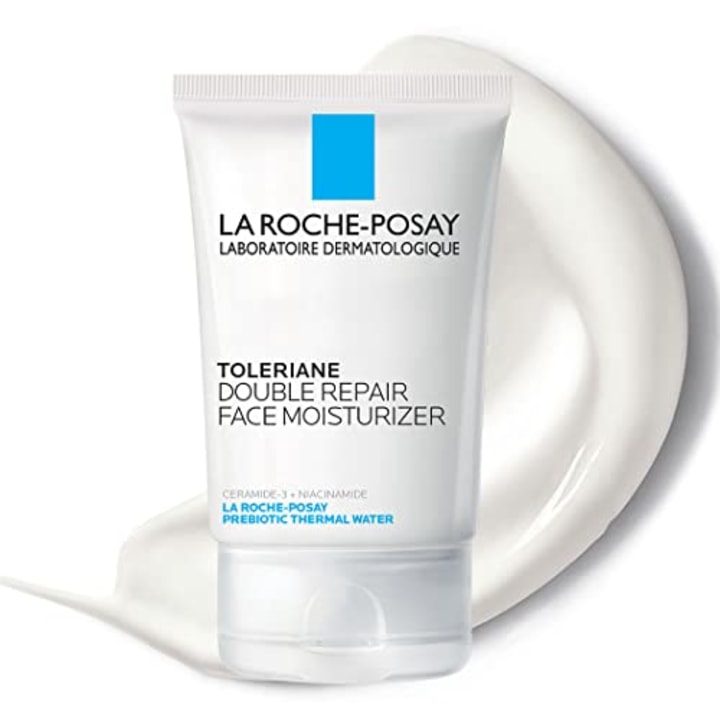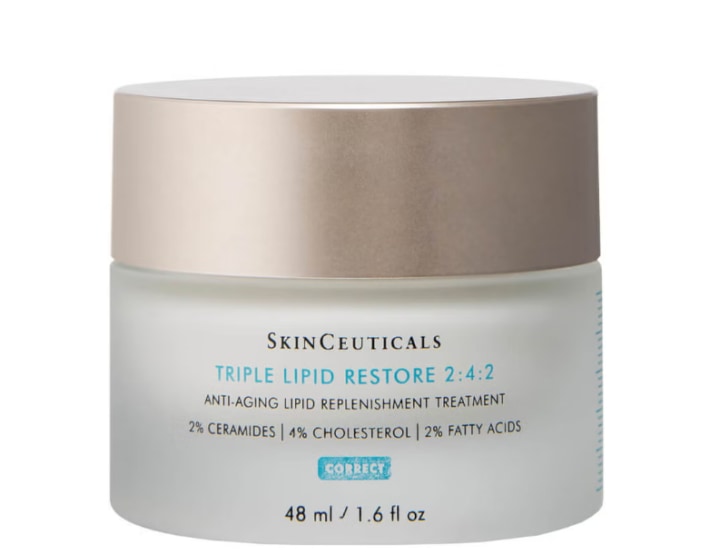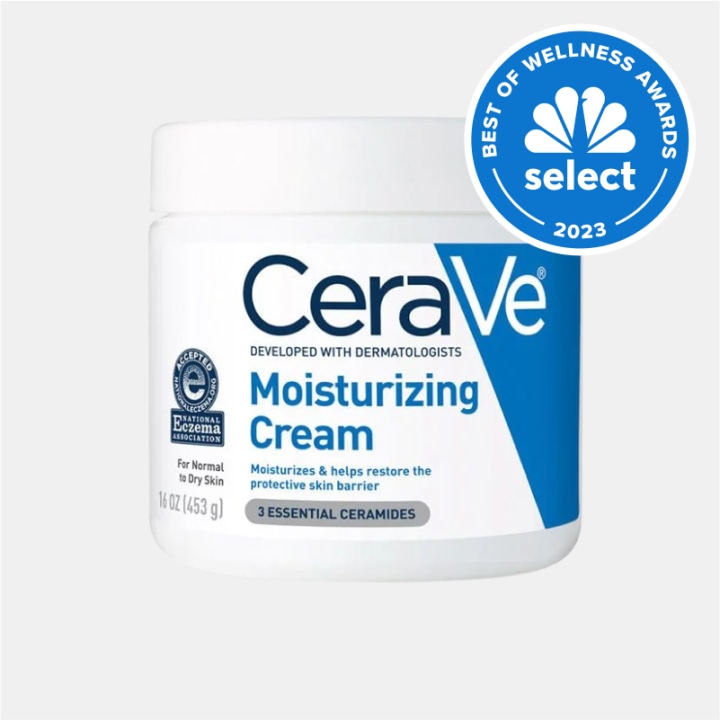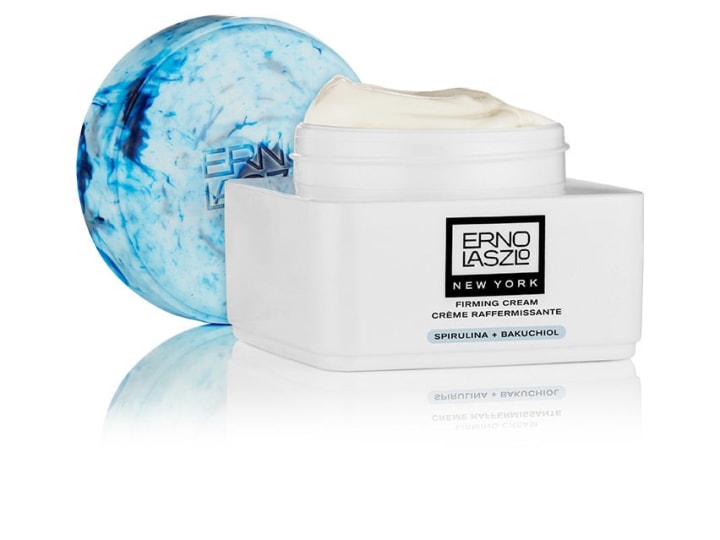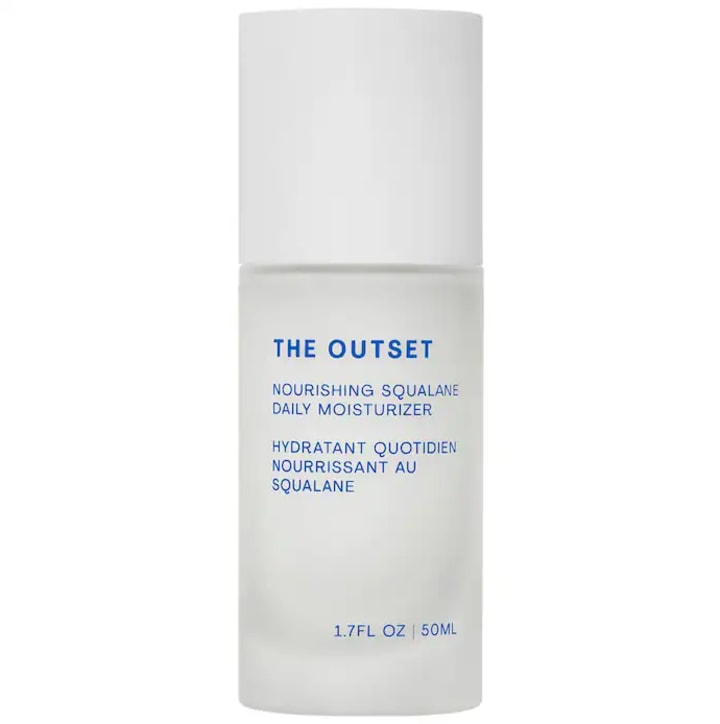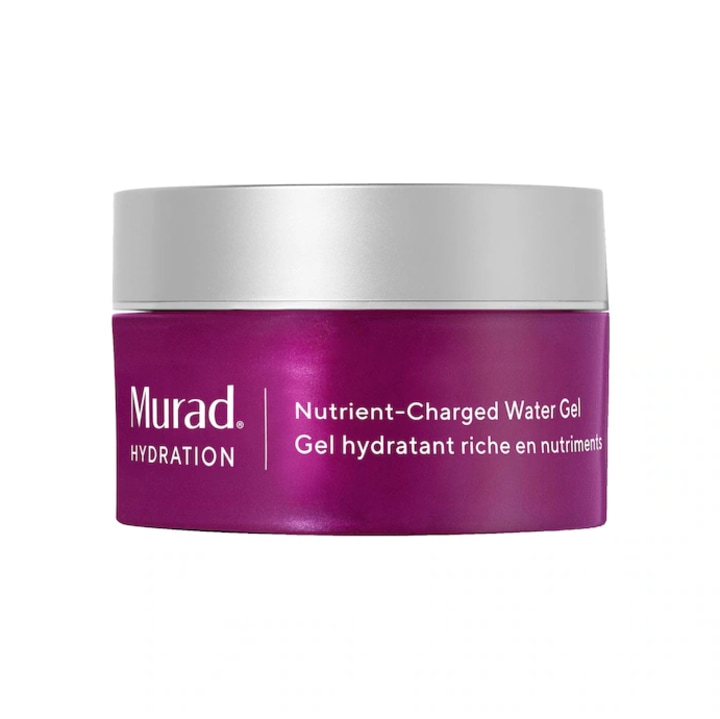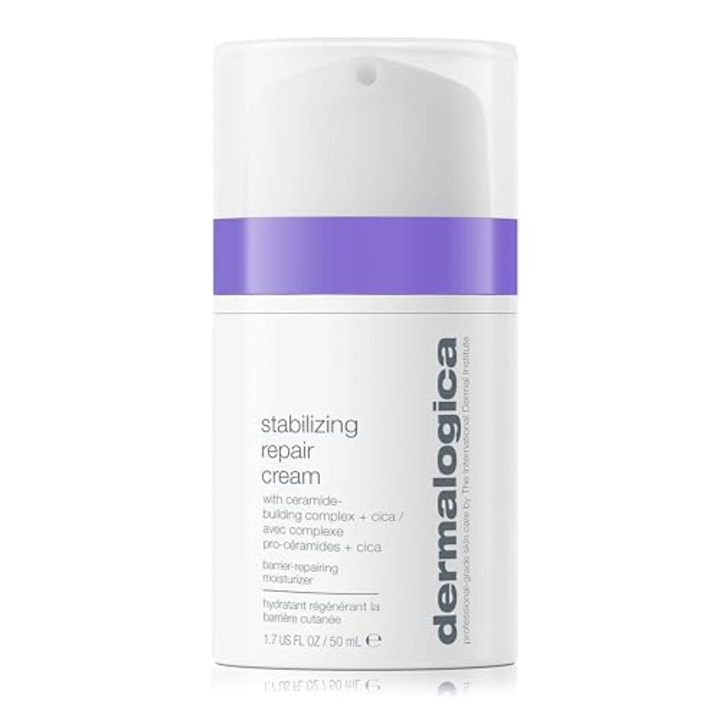Our skin is constantly aging, but those experiencing physical signs of aging like fine lines, wrinkles and excessive dryness may want to consider adjusting their skin care routine — specifically when it comes to moisturizers. In general, moisturizers are meant to introduce hydration into the skin, but it’s an especially important skin care step as the skin naturally becomes more prone to more dryness over time.
“As we age, there are several skin factors that make our skin drier,” says Dr. Lauren Moy, a board-certified dermatologist and double board-certified surgeon of Moy MD in California.
If you’re curious about how to choose a moisturizer that’ll be compatible with your mature skin, we spoke to three board-certified dermatologists about the best mature skin-friendly moisturizers and what to look for when shopping for one. We also put together a list of what to shop based on their recommendations and guidance and included our own picks that are in line with expert guidance.
SKIP AHEAD How we picked the best moisturizers for mature skin | The best moisturizers for mature skin in 2024 | How to shop for moisturizers for mature skin | How to properly apply moisturizers for mature skin
How we picked the best moisturizers for mature skin
A moisturizer for mature skin should keep the skin hydrated while targeting skin care issues that occur as we age, such as sun spots, fine lines, wrinkles and loss of firmness, according to our experts. When shopping they recommend keeping the following factors in mind:
- Ingredients: Those with mature skin should look for ingredients that address increased dryness, mitigate transepidermal water loss and repair the skin barrier, the outermost layer of skin responsible for keeping irritants out and moisture in. Some of the best ingredients for mature skin include hyaluronic acid, glycerin and ceramides, says Dr. Reshmi Kapoor, a board-certified dermatologist and owner and founder of Brooklyn Dermatology in New York City. Kapoor also recommends looking for antioxidants, which protect against free radical damage, she says. To boost collagen and elastin production, retinol, a vitamin A derivative, can help to improve elasticity and firmness with continued use. Finally, as with all skin types, those with mature skin should be consistent with SPF application, which can include chemical and physical protection.
- Skin type: Your skin type will play a role in what type of moisturizer you use. For instance, those with oily skin will benefit from gel-based moisturizers that are noncomedogenic because they have a lightweight consistency and won’t clog pores. People with dry skin should opt for a rich, cream-based moisturizer to lock in hydration and support the skin barrier. If you have sensitive skin, look for gentle formulas that don’t have dyes or fragrance, as these can lead to irritation.
- Type of moisturizer: There are three main types of moisturizers: humectants, emollients and occlusives. “Humectants, such as hyaluronic acid, form bonds with water molecules, drawing water to the skin’s surface and helping the skin appear more plump,” says Dr. Jeremy Brauer, a board-certified dermatologist and dermatologic surgeon at Spectrum Skin and Laser in New York. “Emollients serve to soften and smooth the skin’s surface and improve texture and suppleness by filling gaps between skin cells.” Finally, there are occlusives, which Brauer says are typically thick in consistency and work to create a protective barrier on the surface of skin. Occlusives help prevent water loss, which preserves and maintains the skin’s hydration, he says.
The best moisturizers for mature skin in 2024
La Roche-Posay Toleriane Double Repair Face Moisturizer
Both Moy and Kapoor recommend this moisturizer from La Roche-Posay. “It has prebiotics that act on the microbiome and help restore skin’s natural protective barrier,” says Moy. It’s also made with glycerin to attract moisture and ceramides to seal that moisture in, according to the brand. The fragrance-free, lightweight cream will hydrate the skin without it feeling heavy or greasy, making it a great option for all skin types, sensitive included, according to reviews.
Type: Cream | Key ingredients: Ceramides, niacinamide, glycerin | Skin type: Sensitive, dry
SkinCeuticals Triple Lipid Restore 2:4:2
A favorite of both Kapoor and Moy, this rich cream moisturizer is made up of 2% ceramides to support the skin barrier, 4% cholesterol to reduce dryness and 2% fatty acids to restore elasticity, according to the brand. “This lipid ratio restores essential skin lipids lost from natural aging or environmental aggressors,” says Moy. You can use the moisturizer twice a day, morning and evening, and works well with other skin care products since it doesn’t have potent actives like vitamin C, acids or retinol.
Type: Cream | Key ingredients: Ceramides, vitamin E, fatty acids | Skin type: Dry, normal
Cerave Moisturizing Cream
This fragrance-free moisturizer is a recommendation from Brauer, who says that even though it has a thicker consistency, it’s gentle and works for all skin types. It’s noncomedogenic and doesn’t leave behind a greasy film, making it great for those with sensitive or oily skin. It also has powerful hydrators like hyaluronic acid and ceramides to give you that long-lasting hydration for drier skin types, according to Cerave. Plus, it’s less likely to cause inflammation since it has the Seal of Acceptance from the National Eczema Association (NEA).
Type: Cream | Key ingredients: Ceramides, hyaluronic acid | Skin type: Dry, normal
Erno Laszlo Firming Cream
The Erno Laslzo Firming Cream is pricey at first glance, but worth the splurge if you’re looking for moisturized, filtered-like skin. It’s made with a blend of occlusive and emollient ingredients that’ll compensate for your skin’s lack of moisture, such as olive oil, shea butter and chia seed oil. It also has a plant-based alternative to retinol, bakuchiol, which is ideal for skin types that are too sensitive to use retinol but wish to reap the benefits of plumper, firmer skin.
I use this cream as part of my nighttime skin care routine and it sufficiently hydrates my severely dry, sensitive skin. I always wake up to a fresher, glowing complexion and a noticeably smoother texture when I’ve used this cream the night before. I also love that it also absorbs quickly into my skin, and that it doesn’t require a ton of product to hydrate my face and neck.
Type: Cream | Key ingredients: Bakuchiol, spirulina maxima, olive oil, shea butter, chia seed oil | Skin type: All skin types
The Outset Nourishing Squalane Daily Moisturizer
Brauer recommends this noncomedogenic daily moisturizer for oily skin types, touting its lightweight feel and long-lasting hydration. “Even though oily skin feels more greasy, this doesn’t mean it’s properly hydrated,” he says. “It’s extremely important to look for noncomedogenic formulas, like this one that’s made with soothing botanical extracts to reduce the look of redness.” This also comes in a refillable glass bottle — great for those looking to reduce waste.
Type: Cream | Key ingredients: Squalane, avocado, plum oils | Skin type: Oily
Murad Nutrient-Charged Water Gel Moisturizer
Oily skin types fare well with a weightless gel-based moisturizer like this one from Murad. The oil-free formula is made up of five peptides including Oligopeptide-1, which improves skin texture and elasticity, and Polypeptide-11, which supports collagen production and skin renewal, says Moy. In addition to peptides, the moisturizer has five minerals and five vitamins that restore moisture, soften wrinkles and maintain a healthy skin barrier, according to Murad.
Type: Gel | Key ingredients: Minerals, peptides, vitamins | Skin type: Oily
Dermalogica Stabilizing Repair Cream
Brauer recommends this lightweight cream from Dermalogica because it “includes a ceramide-building complex to protect the skin barrier,” he says. It’s also fortified with squalane, an ingredient that smooths uneven skin texture and protects against future moisture loss, according to the brand. Unlike other moisturizers that live in a tub container, this is in a bottle with a pump applicator, which makes it easy to apply and travel with.
Type: Cream | Key ingredients: Ceramide-building complex, squalane | Skin type: All skin types
How to shop for moisturizers for mature skin
When shopping, our experts recommend looking at several factors, including the key ingredients in the formula and your skin type. Below, we highlight their suggestions in greater detail.
Choose ingredients wisely
Our skin goes through several changes as we age, making it necessary to switch up the skin care ingredients we use accordingly. “As we age, collagen and elastin fibers in the skin break down, causing the texture to be more rough and uneven,” says Moy. “Accumulated sun exposure can cause sunspots, freckles and uneven pigmentation, which can also lead to the formation of fine lines and wrinkles.” Peptides (which are short chains of amino acids, the building blocks of proteins) in moisturizers can be helpful for offsetting these age-related skin changes, as they stimulate collagen synthesis, improve skin firmness and elasticity and reduce expression lines, depending on the peptide used.
Moy points out that the skin’s natural renewal process slows down with age, leading to a duller complexion and a longer recovery time for wounds. “Vitamin C, an antioxidant that helps protect the skin from free radical damage caused by UV radiation and environmental pollutants, can help brighten the complexion,” she says.
Finally, there are several factors that contribute to drier skin as we age such as decreased oil production, thinning of the skin and a decreased ability to retain moisture, says Moy. Skin-hydrating ingredients like hyaluronic acid, glycerin, niacinamide and ceramides will help maintain the skin’s moisture barrier and fend off future dryness.
Consider your skin type
All skin types need moisturizer, but for mature skin, it’s important to look at your skin’s unique needs. Moisturizers with a matte finish can help reduce the appearance of shininess in those with oily skin, says Brauer, who notes that oily skin types should also avoid moisturizers with high oleic acid to prevent excess oil production. For dry skin, focus on repairing the skin’s barrier function. Look for lipids like fatty acids, ceramides and natural cholesterol, and avoid moisturizers that have salicylic acid, as the exfoliating properties can strip the skin of moisture, says Brauer.
Finally, the best moisturizer for sensitive, mature skin simultaneously calms irritation and reduces the appearance of redness while strengthening the skin barrier with as few ingredients as possible, says Brauer. You might benefit from soothing ingredients like colloidal oatmeal, ceramides, hyaluronic acid and niacinamide. In any case, if you have severely sensitive skin, Brauer recommends applying a small amount of product to the inside of your upper arm to rule out irritation or an allergic reaction.
How to properly use a moisturizer
You should apply moisturizers over lighter-consistency formulas like serums and toners. When applying moisturizer onto the skin, first use a gentle cleanser to rid the skin of all dirt, oil, makeup and impurities. Brauer says that the skin should be clean and damp (such as immediately after a shower or washing your face). “The extra water on the skin helps hydrate better and minimizes risk of water loss from the skin’s surface,” he says. Taking a quarter-sized amount and applying gentle pressure, massage the moisturizer into your skin using circular, upward motions. “Avoid rubbing or tugging at the skin, as this can cause unnecessary friction and potential irritation,” says Moy.
Most moisturizers that don’t have potent ingredients are safe to use morning and evening, but you should generally only apply formulas with exfoliants, retinol or vitamin C at certain times of the day. For instance, while you can use vitamin C during the day or night, applying it in the morning is the most ideal time since it helps provide antioxidant protection throughout the day and enhances the effectiveness of sunscreen, says Moy.
If you plan on using a moisturizer with retinol, you should plan to incorporate it into your routine low and slow, and only at nighttime. “Start with a lower concentration and gradually increase frequency to minimize irritation,” says Moy. “It’s also crucial to use sunscreen daily, as retinol can increase the skin’s overall sensitivity to sunlight.”
Meet our experts
At NBC Select, we work with experts who have specialized knowledge and authority based on relevant training and/or experience. We also take steps to ensure all expert advice and recommendations are made independently and without undisclosed financial conflicts of interest.
- Reshmi Kapoor is a board-certified dermatologist and the owner and founder of Brooklyn Dermatology in New York City. She specializes in acne, melasma and hair loss.
- Lauren Moy is a board-certified dermatologist and double board-certified surgeon of Moy MD in California. She specializes in cosmetic dermatology and plastic surgery.
- Jeremy Brauer is a board-certified dermatologist and dermatologic surgeon at Spectrum Skin and Laser in New York.
Why trust NBC Select?
Michelle Rostamian has more than 10 years of experience covering beauty and skin care topics. For this story, Rostamian spoke to board-certified dermatologists and included their direct recommendations and products based on their guidance.
Catch up on Select’s in-depth coverage of personal finance, tech and tools, wellness and more, and follow us on Facebook, Instagram, Twitter and TikTok to stay up to date.
